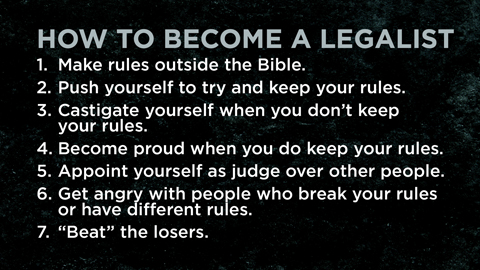In previous posts I have written that Legalism is the biggest threat to church unity, and that you are better off being a sinner than a legalist.

So since legalism is so serious, it is important to know whether or not you are a legalist.
Here are 10 Signs you Might be a Legalist
- If you believe there is a sin you think God cannot forgive, you might be a legalist.
- If you believe there is a limit to the grace of God, you might be a legalist.
- If you believe that God’s blessings are reserved only for the obedient, you might be a legalist.
- If you believe that certain behaviors disqualify a person from joining God’s family, you might be a legalist.
- If you believe that the presence of ongoing sin in a person’s life causes them to lose their eternal life, you might be a legalist.
- If you believe that the presence of ongoing sin in a person’s life proves that they never had eternal life in the first place, you might be a legalist.
- If you believe that God loves us more if we obey Him more, you might be a legalist.
- If you believe that all Christians must believe and act like you do, you might be a legalist.
- If you believe that our standing with God is based on how well we keep the Ten Commandments, you might be a legalist.
- If you believe that people who accept evolution, love homosexuals, and vote democrat cannot be true Christians, you might be a legalist.
Have any to add? Want to object? State your opinion in the comment section below!





 It’s doesn’t look like sin! But at it’s core, legalism fosters pride, arrogance, judgmentalism, and self-righteousness.
It’s doesn’t look like sin! But at it’s core, legalism fosters pride, arrogance, judgmentalism, and self-righteousness. Yes, Jesus said that “Unless your righteousness exceeds that of the Scribes and Pharisees, you will never enter the Kingdom of heaven” (Matthew 5:20). But Jesus was not calling His followers to become more righteous than the scribes and Pharisees. He was saying that when it comes to personal righteousness, you have to be more perfect than the scribes and pharisees, which is impossible! Therefore, don’t even try! Fall upon the grace, mercy, and love of God instead.
Yes, Jesus said that “Unless your righteousness exceeds that of the Scribes and Pharisees, you will never enter the Kingdom of heaven” (Matthew 5:20). But Jesus was not calling His followers to become more righteous than the scribes and Pharisees. He was saying that when it comes to personal righteousness, you have to be more perfect than the scribes and pharisees, which is impossible! Therefore, don’t even try! Fall upon the grace, mercy, and love of God instead.




 Proverbs 25:22 instructs us to heap burning coals on the heads of our enemies.
Proverbs 25:22 instructs us to heap burning coals on the heads of our enemies.  This is quite different than setting someone’s head on fire.
This is quite different than setting someone’s head on fire.

 As I wrote this post, I went and watched the search terms roll through the real time reporting screen of Google Analytics. Over the course of twenty minutes, I saw these search terms come across my screen:
As I wrote this post, I went and watched the search terms roll through the real time reporting screen of Google Analytics. Over the course of twenty minutes, I saw these search terms come across my screen:
